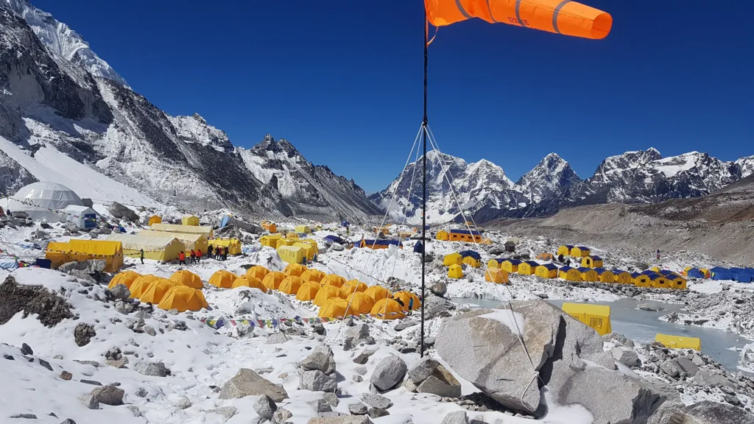The Nepalese army says it has removed eleven tonnes of rubbish, four corpses and one skeleton from Mount Everest and two other Himalayan peaks this year.
It took troops 55 days to recover the rubbish and bodies from Everest, Nuptse and Lhotse mountains.
It is estimated that more than fifty tonnes of waste and more than 200 bodies cover Everest.
The army began conducting an annual clean-up of the mountain, which is often described as the world’s highest garbage dump, in 2019 during concerns about overcrowding and climbers queueing in dangerous conditions to reach the summit.
The five clean-ups have collected 119 tonnes of rubbish, 14 human corpses and some skeletons, the army says.
This year, authorities aimed to reduce rubbish and improve rescues by making climbers wear tracking devices and bring back their own poo.
In the future, the government plans to create a mountain rangers team to monitor rubbish and put more money toward its collection, Nepal's Department of Tourism director of mountaineering Rakesh Gurung told the BBC.
For the spring climbing season that ended in May, the government issued permits to 421 climbers, down from a record-breaking 478 last year. Those numbers do not include Nepalese guides. In total, an estimated 600 people climbed the mountain this year.
This year, eight climbers died or went missing, compared to 19 last year.
A Brit, Daniel Paterson, and his Nepalese guide, Pastenji Sherpa, are among those missing after being hit by falling ice on 21 May.
Mr Paterson’s family started a fundraiser to hire a search team to find them, but said in an update on 4 June that recovery “is not possible at this time” because of the location and danger of the operation.
Mr Gurung said the number of permits was lower this year because of the global economic situation, China also issuing permits and the national election in India which reduced the number of climbers from that country.
The number of permits will likely drop more after Nepal’s Supreme Court ordered the government in May to limit permits. The preliminary order didn't set a maximum number.
Mr Gurung says he welcomes the order and the government is thinking about reforms such as staggering climbers to reduce traffic jams at the summit.
The government will work with experts to determine a safe number of climbers, Mr Gurung said.
"Without the scientific study, it can’t be said what will be the perfect number for Mount Everest," he said.
Latest Stories
-
Center for Learning and Childhood Development Director Dr Kwame Sakyi honoured at Ghana Philanthropy Awards
3 hours -
Asantehene receives 28 looted artefacts
4 hours -
CAF WCL 2024: Ghana’s Thelma Baffour wins title with TP Mazembe
5 hours -
Benjamin Boakye slams politicisation of energy sector issues and ECG’s inefficiencies
5 hours -
Erastus Asare Donkor and Dr Neta Parsram win big at 10th Mining Industry Awards
5 hours -
Government is “suppressing information” about power sector challenges – IES Director
5 hours -
Majority of our debts caused by forex shortfall – ECG Boss
6 hours -
Pan-African Savings and Loans supports Ghana Blind Union with boreholes
6 hours -
Bole-Bamboi MP Yussif Sulemana donates to artisans and Bole SHS
6 hours -
Top up your credit to avoid potential disruption – ECG to Nuri meter customers
7 hours -
Dutch & Co wins 2024 Entrepreneur of the Year Award
7 hours -
We’ll cut down imports and boost consumption of local rice and other products – Mahama
9 hours -
Prof Opoku-Agyemang donates to Tamale orphanage to mark her birthday
10 hours -
Don’t call re-painted old schools brand new infrastructure – Prof Opoku-Agyemang tells gov’t
11 hours -
Sunon Asogli plant will be back on stream in a few weeks – ECG
11 hours

